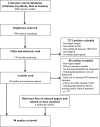Behavioral trainings and manipulations to reduce delay discounting: A systematic review
- PMID: 31270766
- PMCID: PMC6863952
- DOI: 10.3758/s13423-019-01629-2
Behavioral trainings and manipulations to reduce delay discounting: A systematic review
Abstract
In everyday decision-making, individuals make trade-offs between short-term and long-term benefits or costs. Depending on many factors, individuals may choose to wait for larger delayed reward, yet in other situations they may prefer the smaller, immediate reward. In addition to within-subject variation in the short-term versus long-term reward trade-off, there are also interindividual differences in delay discounting (DD), which have been shown to be quite stable. The extent to which individuals discount the value of delayed rewards turns out to be associated with important health and disorder-related outcomes: the more discounting, the more unhealthy or problematic choices. This has led to the hypothesis that DD can be conceptualized as trans-disease process. The current systematic review presents an overview of behavioral trainings and manipulations that have been developed to reduce DD in human participants aged 12 years or older. Manipulation studies mostly contain one session and measure DD directly after the manipulation. Training studies add a multiple session training component that is not per se related to DD, in between two DD task measurements. Ninety-eight studies (151 experiments) were identified that tested behavioral trainings and manipulations to decrease DD. Overall, results indicated that DD can be decreased, showing that DD is profoundly context dependent and changeable. Most promising avenues to pursue in future research seem to be acceptance-based/mindfulness-based trainings, and even more so manipulations involving a future orientation. Limitations and recommendations are discussed to identify the mechanistic processes that allow for changes in discount rate and behavior accordingly.
Keywords: Delay discounting; Health behaviors; Manipulations; Temporal discounting; Trainings; Trans-disease process.
Figures
References
-
- Ainslie G. Picoeconomics. Cambridge: Cambridge University Press; 1992.
-
- Ainslie G. Breakdown of will. New York: Cambridge University Press; 2001.
Publication types
MeSH terms
LinkOut - more resources
Full Text Sources


